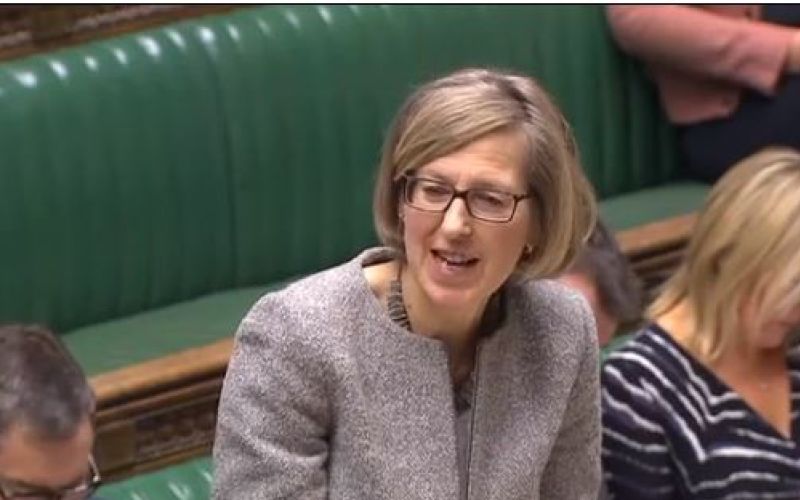The minister for disabled people is refusing to meet a coalition of disabled people’s organisations, in an apparent breach of the UN disability convention.
The coalition wrote to Sarah Newton yesterday (Wednesday) to express its “deep disappointment and concern” about her refusal to meet them to discuss the UK’s failure to implement the UN Convention on the Rights of Persons with Disabilities (CRPD).
The letter, signed by 14 prominent disabled leaders, asks Newton (pictured): “How can the government improve the lives of disabled people if it is not engaging directly with disabled people?”
The UN committee on the rights of persons with disabilities told the UK government last September in its “concluding observations” that it needed to make more than 80 improvements to the ways its laws and policies affect disabled people’s human rights.
In its review of the UK’s implementation of CRPD, the committee raised concerns and made recommendations on all but three of the 33 treaty articles the UK could have breached.
Newton’s letter refusing a meeting was sent on 10 July, two weeks before international development secretary Penny Mordaunt told an international disability rights conference in London: “When disabled people are included, great things happen.”
Mordaunt and her civil servants spent much of the Global Disability Summit last month telling other countries and organisations to sign up to a new Charter for Change.
The charter calls on those signing it to “hold ourselves and others to account for the promises we have made here today” and to “strive for real change” through implementation of CRPD.
CRPD says (in article four) that governments must, in implementing the convention, “closely consult with and actively involve persons with disabilities… through their representative organizations”.
It also says (article 33) that “civil society, in particular persons with disabilities and their representative organizations, shall be involved and participate fully” in monitoring the implementation of the convention in each country.
Newton’s letter appears to breach both article four and article 33 as the coalition has been seeking a ministerial meeting since February.
Tracey Lazard, chief executive of Inclusion London, one of the coalition’s members, says in yesterday’s letter: “We are extremely disappointed that as minister for disabled people you are not able to find the time to meet with the only UK wide coalition of disabled people’s organisations set up to monitor and engage with the UK government on CRPD issues.”
Other members of the UK CRPD Monitoring Coalition of Disabled People’s Organisations include Disability Wales, The Alliance for Inclusive Education, Disabled People Against Cuts, Sisters of Frida, Inclusion Scotland and the Mental Health Resistance Network, several of which are members of the Reclaiming Our Futures Alliance.
In her two-paragraph letter to the coalition, Newton says she will not be able to meet with them “due to ongoing diary commitments” but “would be pleased to have my officials do so on my behalf”.
It is not the first time that Newton’s commitment to disability rights has been questioned.
Last December, she refused to explain why she had apparently failed to attend or organise any events – or even post a message of support on social media – on the UN’s International Day of Persons with Disabilities (IDPD).
The coalition’s letter also reminds Newton that she previously stated that she strongly welcomed a meeting to discuss how the government was implementing CRPD.
In February, the coalition wrote to the prime minister, Theresa May, to question the lack of progress since the UN committee produced its “damning” report and to ask for a meeting to discuss their concerns.
In her response, sent on 25 April, Newton said: “I strongly welcome your proposal of a meeting to discuss how Government is implementing the concluding observations of the Committee for the Convention on the Rights of Persons with Disabilities and planning to work with organisations led by disabled people.
“This closely fits with work I have been leading with the Office for Disability Issues within government.”
DWP had not been able to comment by 1.30pm today (Thursday), after being approached yesterday afternoon.
A note from the editor:
Please consider making a voluntary financial contribution to support the work of DNS and allow it to continue producing independent, carefully-researched news stories that focus on the lives and rights of disabled people and their user-led organisations.
Please do not contribute if you cannot afford to do so, and please remember that DNS is not a charity. It is run and owned by disabled journalist John Pring and has been from its launch in April 2009.
Thank you for anything you can do to support the work of DNS…

 Government ignores warnings of new DWP deaths, and UN intervention, as MPs pass universal credit cuts bill
Government ignores warnings of new DWP deaths, and UN intervention, as MPs pass universal credit cuts bill Urgent letter from UN to Labour government warns: We think your cuts continue Tory attack on disability rights
Urgent letter from UN to Labour government warns: We think your cuts continue Tory attack on disability rights Race against time to secure DWP deaths evidence before parliament passes new benefit cuts bill
Race against time to secure DWP deaths evidence before parliament passes new benefit cuts bill